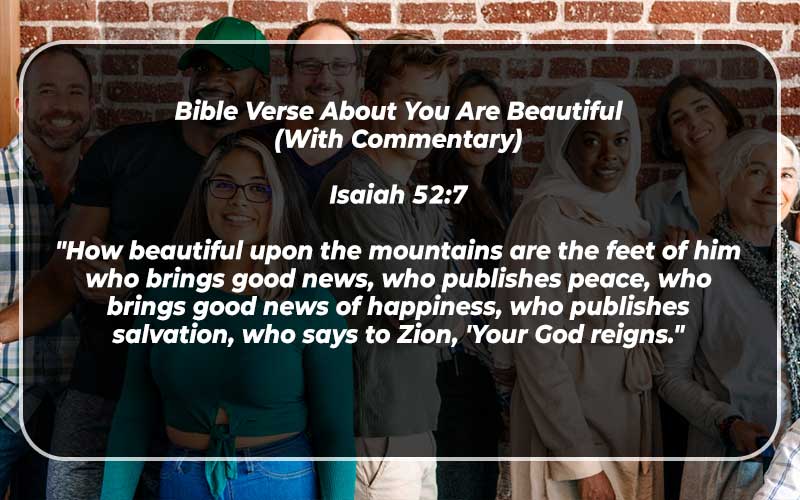The Bible’s interpretation of beauty goes much beyond physical appearances. It is inextricably linked to the essence of one’s soul, character, and God’s transformative work. We study the great truth that each human is naturally lovely in the eyes of their God in these 25 verses. This beauty stems from God’s design, His redemptive work, and the cultivation of qualities that mirror His personality.
Bible Verse About You Are Beautiful
Song of Solomon 4:7:
“You are altogether beautiful, my love; there is no flaw in you.”
The Song of Solomon celebrates the beauty of love and intimacy, conveying a sense of completeness and flawlessness in the eyes of the beloved.
Psalm 139:14:
“I praise you, for I am fearfully and wonderfully made. Wonderful are your works; my soul knows it very well.”
Acknowledging the wonder of God’s creation affirms the inherent beauty of each person, recognizing the intentional and masterful design.
Ecclesiastes 3:11:
“He has made everything beautiful in its time. Also, he has put eternity into man’s heart, yet so that he cannot find out what God has done from the beginning to the end.”
The verse speaks to the divine timing and purpose embedded in God’s creation, reflecting a beauty that unfolds over time.
1 Peter 3:3-4:
“Do not let your adorning be external—the braiding of hair and the putting on of gold jewelry, or the clothing you wear— but let your adorning be the hidden person of the heart with the imperishable beauty of a gentle and quiet spirit, which in God’s sight is very precious.”
Peter emphasizes the enduring beauty found in a gentle and quiet spirit, transcending external adornments and pointing to the inward virtues cherished by God.
Proverbs 31:30:
“Charm is deceitful, and beauty is vain, but a woman who fears the Lord is to be praised.”
The Proverbs highlight the fleeting nature of external beauty and emphasize the enduring praise for those who cultivate a reverent relationship with the Lord.
Isaiah 61:3:
“…to grant to those who mourn in Zion— to give them a beautiful headdress instead of ashes, the oil of gladness instead of mourning, the garment of praise instead of a faint spirit; that they may be called oaks of righteousness, the planting of the Lord, that he may be glorified.”
Isaiah portrays God’s transformative work, exchanging mourning for joy and providing a beautiful headdress in place of ashes, symbolizing restoration and divine beauty.
Psalm 45:11:
“and the king will desire your beauty. Since he is your lord, bow to him.”
This psalm speaks to the desire for the beauty of the bride, symbolizing the admiration and love bestowed upon those in relationship with the King.
2 Corinthians 5:17:
“Therefore, if anyone is in Christ, he is a new creation. The old has passed away; behold, the new has come.”
The transformative power of being a new creation in Christ signifies a shift from the old to the new, reflecting a redeemed and beautiful identity.
Psalm 27:4:
“One thing have I asked of the Lord, that will I seek after: that I may dwell in the house of the Lord all the days of my life, to gaze upon the beauty of the Lord and to inquire in his temple.”
David’s longing to dwell in the house of the Lord is rooted in the desire to gaze upon the beauty of God, reflecting the soul’s yearning for divine beauty.
Romans 8:28:
“And we know that in all things God works for the good of those who love him, who have been called according to his purpose.”
The assurance that God works all things for good emphasizes the purposeful and beautiful outcomes woven into the lives of those who love Him.
Psalm 149:4:
“For the Lord takes pleasure in his people; he adorns the humble with salvation.”
God’s pleasure in His people and the adornment of the humble with salvation exemplify a divine beauty bestowed upon those who embrace humility.
Isaiah 52:7:
“How beautiful upon the mountains are the feet of him who brings good news, who publishes peace, who brings good news of happiness, who publishes salvation, who says to Zion, ‘Your God reigns.'”
The beauty described in Isaiah is linked to the proclamation of good news and the publication of salvation, highlighting the radiance of God’s redemptive message.

James 1:11:
“For the sun rises with its scorching heat and withers the grass; its flower falls, and its beauty perishes. So also will the rich man fade away in the midst of his pursuits.”
James uses the imagery of fading flowers to convey the transient nature of external beauty, contrasting it with the enduring beauty found in spiritual pursuits.
Psalm 90:17:
“Let the favor of the Lord our God be upon us, and establish the work of our hands upon us; yes, establish the work of our hands!”
The psalmist’s prayer for the favor of the Lord to establish the work of hands reflects the beauty inherent in a life aligned with God’s purpose.
Romans 10:15:
“And how are they to preach unless they are sent? As it is written, ‘How beautiful are the feet of those who preach the good news!'”
The beauty associated with preaching the good news underscores the significance of sharing God’s redemptive message.
Psalm 96:9:
“Worship the Lord in the splendor of holiness; tremble before him, all the earth!”
The splendor of holiness in worship reflects a divine beauty emanating from a heart surrendered to God.
Ezekiel 16:14:
“And your renown went forth among the nations because of your beauty, for it was perfect through the splendor that I had bestowed on you, declares the Lord God.”
Ezekiel uses the metaphor of Jerusalem’s beauty to convey God’s bestowed splendor, emphasizing the perfection found in His design.
Psalm 8:3-5:
“When I look at your heavens, the work of your fingers, the moon and the stars, which you have set in place, what is man that you are mindful of him, and the son of man that you care for him? Yet you have made him a little lower than the heavenly beings and crowned him with glory and honor.”
The psalmist marvels at God’s creation and the elevated status of humanity, crowned with glory and honor, reflecting inherent beauty.
Isaiah 60:1:
“Arise, shine, for your light has come, and the glory of the Lord has risen upon you.”
The call to arise and shine is rooted in the recognition of God’s glory rising upon His people, signifying a luminous and beautiful transformation.
2 Timothy 1:7:
“For God gave us a spirit not of fear but of power and love and self-control.”
The spirit of power, love, and self-control bestowed by God reflects the internal virtues that contribute to a beautiful and balanced character.
Psalm 96:6:
“Splendor and majesty are before him; strength and beauty are in his sanctuary.”
The coexistence of strength and beauty in God’s sanctuary signifies the harmonious blend of these qualities in the divine realm.
1 Chronicles 16:29:
“Ascribe to the Lord the glory due his name; bring an offering and come before him! Worship the Lord in the splendor of holiness.”
The splendor of holiness in worship is a form of ascribing glory to God, emphasizing the inherent beauty of a devoted heart.
Psalm 50:2:
“Out of Zion, the perfection of beauty, God shines forth.”
Zion is described as the perfection of beauty from which God shines forth, underscoring the radiant nature of divine presence.
1 Samuel 16:7:
“But the Lord said to Samuel, ‘Do not look on his appearance or on the height of his stature, because I have rejected him. For the Lord sees not as man sees: man looks on the outward appearance, but the Lord looks on the heart.'”
God’s perspective on beauty transcends outward appearances, focusing on the condition of the heart, revealing a deeper and lasting beauty.
Proverbs 31:25:
“Strength and dignity are her clothing, and she laughs at the time to come.”
The strength and dignity described in Proverbs characterize a woman’s clothing, reflecting an inner beauty that fortifies her against future uncertainties.
Also Read: Bible Verses About Understanding Others (With Commentary)
Bible Verses About Time (With Commentary)

